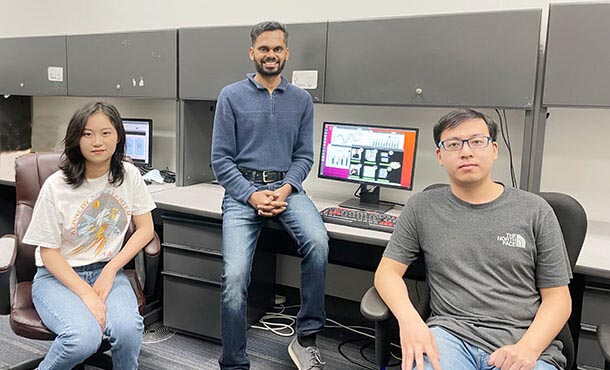
Left to right: Shijia Zhang, Mahanth Gowda and Yilin Liu in their lab in summer of 2021.
Penn State researchers receive best paper award at international conference
8/6/2021
By Sarah Small
UNIVERSITY PARK, Pa. — Three Penn State researchers were awarded the best paper award at the Association for Computing Machinery/Institute of Electrical and Electronics Engineers International 2021 Conference on Internet of Things Design and Implementation (IoTDI).
The paper, “When video meets inertial sensors: Zero-shot domain adaptation for finger motion analytics with inertial sensors,” was written by Penn State computer science and engineering doctoral students Yilin Liu, the first author, and Shijia Zhang, a co-author, along with their adviser, Mahanth Gowda, assistant professor of computer science and engineering.
The best paper awards were selected by an IoTDI committee, who individually reviewed and ranked the papers. From the top five most highly ranked ones, they selected the winning paper based on merit, impact and novelty, according to technical program co-chair Christopher Stewart of Ohio State University.
The paper details a new method of collecting training data for finger motion tracking. Tracking finger motion is used in many applications, including augmented reality, sports analytics and rehabilitation health care.
“While finger motion tracking with cameras is very mature, largely due to availability of massive training datasets for training machine learning algorithms, there is a dearth of training data for developing robust machine learning (ML) models for wearable sensors,” Liu said. “To address this problem, the paper presents ZeroNet, a system that shows the feasibility of developing ML models for wearable sensors with zero training overhead.”
ZeroNet uses publicly available videos to gather training data for performing inferences on wearable devices through transfer learning and domain adaptation techniques.
“We are very thankful to the program committee and organizers of IoTDI 2021 for this recognition,” Gowda said. “This motivates us to take more risks and explore new avenues for innovation.”



